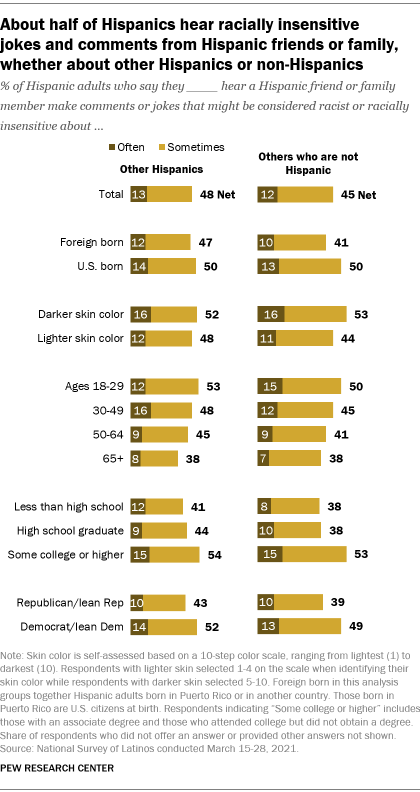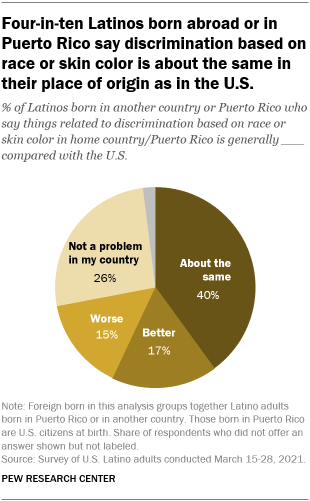
About a quarter of Latino adults say they have personally experienced discrimination or unfair treatment from other Latinos. Having darker skin and being born outside the United States are associated with an increased chance of experiencing this type of discrimination, according to a Pew Research Center survey conducted in March 2021. At the same time, Latinos say they are as likely to experience discrimination or unfair treatment from non-Latinos as from fellow Latinos, regardless of skin color or their country of birth.
Latinos experience discrimination in different ways. In 2021, 23% of Latino Spanish speakers said they had been criticized for speaking Spanish in public, and 20% of all Latinos said they were called offensive names in the last 12 months. Sometimes, Latinos themselves discriminate against other Latinos or make racially insensitive comments or jokes about other Latinos.
Skin color is linked to greater Latino-on-Latino discrimination: About four-in-ten Latinos with darker skin (41%) say they have experienced discrimination or unfair treatment by another Latino, while 25% with lighter skin color say the same. Nativity is linked too. Latinos born in Puerto Rico or in another country are more likely than those born in the 50 U.S. states or the District of Columbia to say they suffered discrimination or unfair treatment by someone who is also Latino (32% vs. 23%).
Still, Hispanics are just as likely to say they personally experienced discrimination or unfair treatment from someone who is not Hispanic. Roughly a third (31%) say so, with skin color also linked to the share of Hispanics who say this has happened to them. Hispanics with darker skin were more likely than those with lighter skin to say they experienced discrimination or were treated unfairly by someone who is not Hispanic (42% vs. 29%).

At the same time, about half (48%) of Hispanics say they hear racist or racially insensitive comments or jokes often (13%) or sometimes (35%) from Hispanic friends and family about other Hispanics.
Younger Latinos, ages 18 to 29, are more likely than Latinos 50 and older to say they hear these types of racially insensitive comments or jokes about other Latinos. And Latinos with college experience are more likely than those with lower levels of educational attainment to say the same.
Hispanics are not just hearing racially incentive comments and jokes about other Hispanics. They are also hearing their family and friends make the same comments about non-Hispanics: 45% of Hispanic adults say they often or sometimes hear Hispanic friends or family members make racist or racially insensitive comments or jokes about others who are not Hispanic.

When it comes to discrimination based on race or skin color in their place of origin, Latinos born in another country or Puerto Rico are generally split on whether things are better or worse there than in the U.S. Four-in-ten (40%) say discrimination based on race or skin color is about the same in both the place of their birth and in the 50 U.S. states and D.C., while 17% say things are better and 15% say things are worse in their place of birth compared with the 50 U.S. states. About a quarter (26%), though, say discrimination based on race or skin color is not a problem in their place of birth.
The more than 62 million Hispanics living in the U.S. are diverse in many ways. They trace their heritage to countries in Latin America and Spain, and have varied demographic and economic backgrounds. And about half (48%) say discrimination based on race or skin color is a very big problem in the U.S.



Be the first to comment